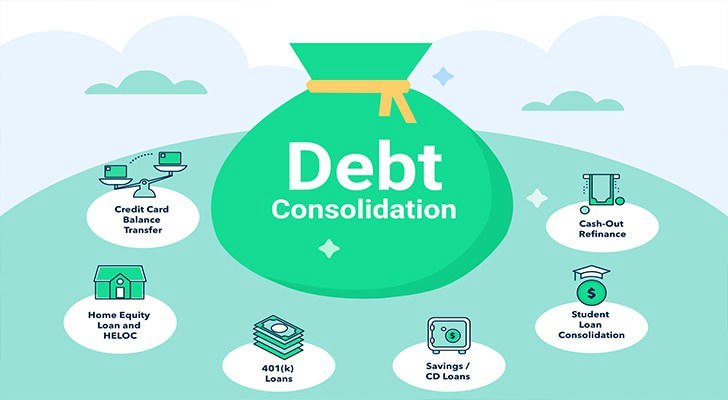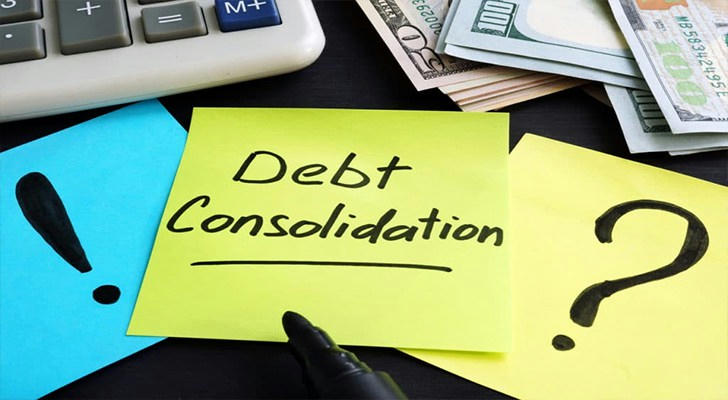Clear Your Debt Faster: The Benefits of Debt Consolidation!
Managing debt can be challenging, especially when you have multiple payments due at different times, with varying interest rates. Keeping track of it all can feel overwhelming. Debt consolidation offers a way to simplify this process, helping you save time, money, and stress while accelerating your journey to financial freedom. Let’s dive into what debt consolidation is, how it works, and why it might be the right step for you.

What is Debt Consolidation?
Debt consolidation is the process of combining multiple debts into one single loan or payment. Instead of making separate payments to various creditors, you consolidate everything into a single account. This often comes with a lower interest rate or more manageable payment terms, making it easier to stay on track.
For example, if you’re paying off several credit cards with interest rates ranging from 18% to 25%, consolidating them into a loan with a 10% interest rate can significantly reduce your financial burden and help you pay off your debt faster.
How Does Debt Consolidation Work?
Debt consolidation can take several forms, depending on your financial situation and the type of debt you have. Here’s a general overview of how the process works:

1.Review Your Debts: List all the debts you want to consolidate, including balances, interest rates, and payment terms.
2.Select a Consolidation Method: Choose the best approach for your needs, such as a personal loan, balance transfer credit card, or debt management program.
3.Apply for a Loan or Program: Submit an application to the lender or financial institution offering the consolidation option.
4.Use Funds to Pay Off Debts: Once approved, the loan or program will be used to pay off your existing debts.
5.Focus on a Single Payment: Start making regular payments on your consolidated debt until it’s fully repaid.
Types of Debt Consolidation
There are several methods to consolidate debt. Here’s a closer look at the most common ones:
1. Personal Loans
You can take out a personal loan from a bank, credit union, or online lender to pay off your existing debts. These loans typically offer lower interest rates than credit cards, especially for borrowers with good credit.
•Best for: Those with multiple unsecured debts like credit cards or medical bills.
•Pros: Fixed monthly payments, predictable repayment schedule, and lower interest rates.
•Cons: May require good credit to qualify.
2. Balance Transfer Credit Cards
Some credit cards allow you to transfer balances from other cards and offer 0% introductory interest rates for a limited period (usually 12–18 months).
•Best for: People with smaller debts that can be repaid quickly.
•Pros: Interest-free payments during the promotional period.
•Cons: Balance transfer fees and high interest rates after the promo period ends.
3. Home Equity Loans or HELOCs
Homeowners can leverage the equity in their property to secure a loan or line of credit. These options typically have lower interest rates since the loan is backed by your home.
•Best for: Individuals with significant home equity and large debts.
•Pros: Lower interest rates and larger loan amounts.
•Cons: Risk of losing your home if you fail to repay.
4. Debt Management Plans (DMPs)
Nonprofit credit counseling agencies can help you create a debt management plan. They negotiate with creditors to reduce interest rates and consolidate your payments into one monthly amount.
•Best for: People with unsecured debts and difficulty managing payments.
•Pros: Professional guidance and reduced interest rates.
•Cons: May take several years to complete.
The Benefits of Debt Consolidation
Consolidating your debt offers numerous advantages, making it an attractive option for many people:

1. Simplified Payments
Keeping track of one payment instead of multiple reduces stress and the risk of missed payments, which can harm your credit score.
2. Lower Interest Rates
By consolidating high-interest debts, you can secure a lower rate, saving you money in the long run.
3. Clear Repayment Timeline
Debt consolidation loans often have fixed repayment terms, so you know exactly when your debt will be paid off.
4. Faster Payoff
With lower interest rates, more of your payment goes toward the principal balance, helping you eliminate debt sooner.
5. Reduced Stress
Managing one consolidated debt is less overwhelming, allowing you to focus on achieving your financial goals.
Is Debt Consolidation Right for You?
While debt consolidation has many benefits, it’s not the right choice for everyone. Consider the following factors before deciding:
1.Your Credit Score: A good credit score can help you qualify for better rates.
2.Debt Amount: Consolidation is most effective for manageable debt. For very large amounts, other strategies like debt settlement may be more suitable.
3.Financial Discipline: You need to commit to regular payments and avoid taking on new debt.
4.Interest Rates: Compare your current rates to the consolidation loan or program to ensure you’ll save money.
Common Pitfalls to Avoid
While debt consolidation can be helpful, there are risks to be aware of:
•Continuing to Use Credit: Avoid accumulating new debt while repaying your consolidated loan.
•Hidden Fees: Watch out for application fees, balance transfer fees, or early repayment penalties.
•Unrealistic Repayment Plans: Choose a loan with monthly payments that fit your budget.
How to Get Started
If you think debt consolidation is right for you, follow these steps to get started:
1.Assess Your Debt: Calculate the total amount you owe and review your current interest rates.
2.Compare Options: Research different consolidation methods and lenders.
3.Apply for a Loan or Program: Gather necessary documents like proof of income and a list of your debts.
4.Commit to Your Plan: Stick to your repayment schedule and avoid unnecessary spending.
Achieve Financial Freedom
Debt consolidation can be a powerful tool to simplify your finances and clear your debt faster. By choosing the right method, staying disciplined, and making consistent payments, you can reduce stress and regain control of your financial future.
